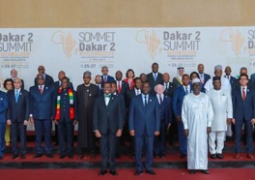
The World Bank supported the GIRAV project with US$40 million while GAFSP also allocated US$16 million for the implementation of the project. The project components include developing sustainable food systems for improved livelihood, productivity and climate resilience, reducing vulnerability through social protection, improving nutrition, and promoting gender and climate resilient WASH.
Speaking at the launching held at the Sir Dawda Kairaba Jawara Conference Center in Bijilo on Wednesday 17 Aug. 2022, the Agriculture Minister Dr. Demba Sabally explained that The Gambia government has prepared the National Agriculture Investment Plan as the country's main investment framework for agriculture development in the medium term from 2019 to 2026. He said the GIRAV objective is to increase food and nutritional security at all levels, especially the vulnerable households.
"This supports the national goal of poverty reduction and improving livelihood. The GIRAV focused on the production and value chain promotion of food crops and vegetables, livestock husbandry, fisheries and agriculture, forestry, and the environment. It also encompasses the following pillars, food and nutritional security, resilience and social protection, and promoting good governance and admin in the agriculture and national resource sector. All these pillars are duly reflective of the development objectives of the Gambia national blueprint,"
Minister Sabally said.
He continued that the project would also strengthen the capacity of key organisations and improve value chain coordination and partnership, develop market infrastructure, improve rural connectivity, promote modern irrigation in women and youth-led agricultural farms, increase access to technology, innovation, and advisory services, building the operating capacity of partner financial institutions.
"The project will scale up achievements on its predecessor project FASDEP while building synergy with other partners, particularly the WFP towards improving climate resilience. Value chain development is the basis for a sustainable homegrown school feeding programme and approaches will be based on structuring the food demand sites to match the supply site. It will also improve smallholder income and productivity by increasing food production, post-harvest management, market access and resilience for identifying the food chains. It will as well promote social protection and food safety net programme to reduce food and nutrition insecurity of vulnerable people, especially those in the project areas."
The permanent secretary at the Ministry of Agriculture, Hassan Jallow, expressed delight, while stating the project is yet another milestone in our collective drive to attain critical national and regional priorities entrenched in our sector policies and strategies.
These two projects, he said, enjoyed long-standing partnerships between the government of the Gambia and donors, namely the World Bank, African Development Bank, and key stakeholders in the food and agricultural sector.
"Both projects are in alignment with our national pathway for the food system in support of the 2030 agenda for sustainable development. The project has been operational for the past six months and is implemented across the country to target the same priority value chain, rice, maize, groundnut, cassava and more."
He further stated that the ministry and its partners are optimistic that the successful implementation of both projects will contribute immensely to ensuring inclusive and sustaining economic growth which remains one of the principle objectives for the Gambia government.
PS added that GAPFP is a five years project funded by GAPFP for the consortium and supervised by the Africa Development Bank, designed to increase food and nutritional security and household income for vulnerable households in the intervention sites and strengthen the homegrown school feeding programme.





